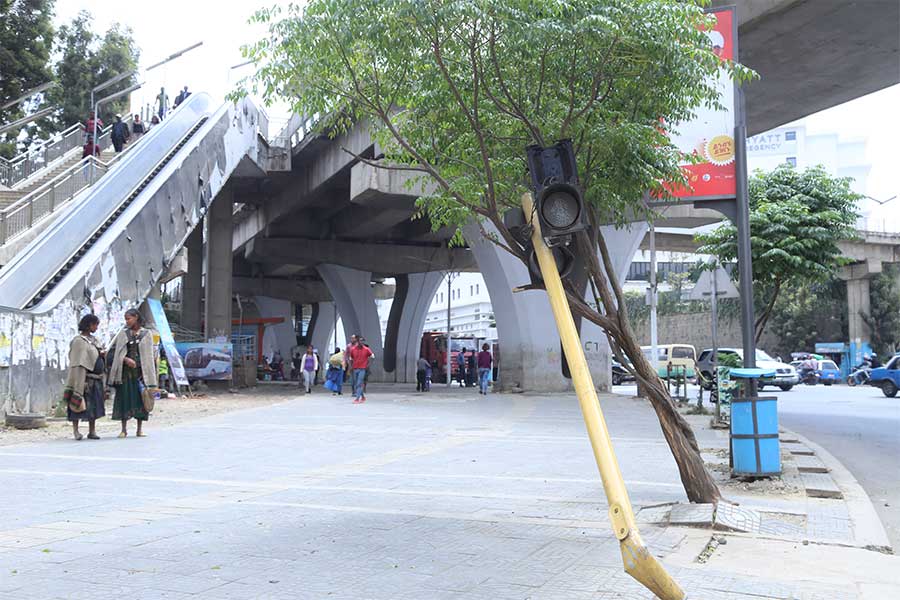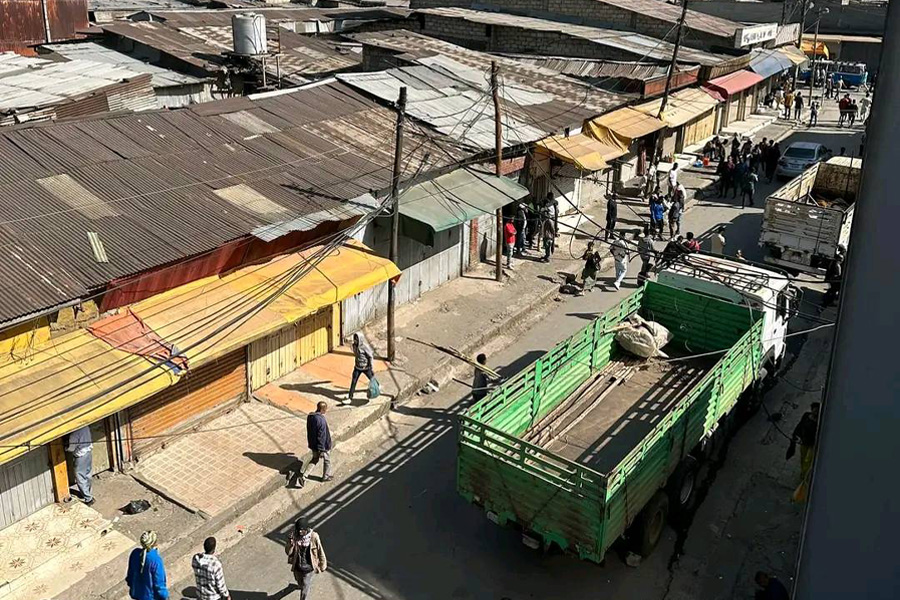
Apr 26 , 2019.
In all the controversies in relation to the claims over Addis Abeba - largely devoid of substance but rich in noisy rhetoric - it is baffling to see MPs representing the capital in parliament remain silent. Never mind that the city has its own council with 138 representatives and a mandate to work in the best interest of their constituencies – the residents and voters of Addis Abeba. They too are quiet.
The 23 MPs of Addis Abeba in parliament appear as bystanders as a segment of their constituencies were faced with problems such as issues in the provision of housing or a project that was designed to expand the water supply of the capital. It is as if they are there for nominal purposes, not to uphold the interests of the political parties that have nominated them.
It only exposes the crises of mandate and legitimacy that Ethiopia’s legislative chambers have suffered. Take the recent cabinet reshuffle by Prime Minister Abiy Ahmed (PhD), his third since he came to office in April 2018. It has only been six months since the last reshuffle.
The Minister for Foreign Affairs, Gedu Andargachew, was nominated and was confirmed by parliament in absentia and without a swearing in before the MPs. Although he has begun to convene meetings at the foreign office, he has yet to fulfill his legal obligation of being sworn in. In democracies, it is customary for legislative houses to respect the choices of the occupant of the highest executive office when it comes to nominations. But MPs in Ethiopian parliament have been historically submissive and hardly any of them questioned the recent reshuffle.
The nation now has its fourth Defense Minister, Lemma Megersa, since Abiy came to power; and Aisha Mohammed, now a minister of Urban Development & Construction, has already served in three different cabinet positions during the same period.
Unfortunately, only one parliamentarian was able to object and six abstained. Under functional democracies where there are checks and balances, this would be considered an almost unanimous endorsement by parliament of the executive. In Ethiopia’s case, even such resistance by MPs is considered a leap in parliament’s assertiveness of its constitutional mandates.
An observer would not realise the key importance of parliament in Ethiopia’s government just by looking at the nation’s contemporary politics. In a country undergoing a significant political transition, parliament has decided to take the back seat, rarely asserting itself. This is despite polarising issues of life and death are cropping up regularly across the country.
This is all the more surprising given that there are major reforms being undertaken both by the executive and the judiciary. The former is taking steps to ensure transparency, accountability and improve delivery. The judiciary is trying to introduce judicial review and bolster itself as an institution that can check the executive. There is still a great deal of gaps that need to be addressed, but it is hard not to take note of the effort.
Most of the discourse is taking place outside parliament. From the reestablishment of the electoral board to the civil society organisations proclamation, debates are taking place in forums and talks shows, not in parliament, which eventually passes them with little debate and often with majority votes.
Even the few differences of opinion seen in parliament, a point referenced as evidence of MPs becoming emboldened, are issues that are highly politicised. One of these was the establishment of the Administrative Boundaries & Identity Issues Commission. Matters that require insight and sophistication, such as the Africa Continental Free Trade Deal Agreement or the civil societies law, passed without a hitch. Their significant implication in the socio-economic sphere is often overlooked.
Parliament is also not setting agendas or challenging the executive on bills that are not referred for passing. For a body with the constitutional powers to initiate investigations, it has been comfortable standing behind the scenes as conflicts have rocked the nation, and displacements become a common sight. There has rarely been accountability by perpetrators or any responsibilities assumed for mismanagement or failures by officials to act properly.
Indeed, a truly accommodating and engaged parliament may come along further down the line. Presently, there is no single opposition party in the House, which has made it nearly impossible to hold to account a member of a party in the executive who belongs to the same party as the MPs.
But ever since Abiy’s rise to power, a couple of significant factors have come to the surface that have already been bubbling for the past few years. The EPRDF, whose constituent parties and allies control every seat in parliament, does not practice anywhere near the democratic centralism it used to, a leftist culture of political discipline. The most it can show for its once famous unity of purpose are press statements that talk of the economy and the rule of law in general terms.
The lack of centralism in EPRDF - its operating principle - is best exemplified in the rift in regional and local governments that are increasingly becoming emboldened and protective, as well as demanding of the rights and interests of their constituents. This is a political development that has completely escaped parliament, which is acting not much different from how it used to a year ago.
Members of parliament may have issues of competence. They may not be resourceful for each MP to have its own office and staff. But the biggest problem MPs suffer is a deep culture of apathy, born out of long years of being pushed around by the executive. They are not used to taking matters into their own hands or using the various resources at hand to get to the bottom of problems.
Issues of competence and constraints in resources, in particular, can be addressed by reducing the gap between legislators and researchers. Creating links with external think tanks and introducing the culture of asking for advisory services by external researchers can be beneficial for individual MPs asked to make legislative decisions on matters as complicated as trade agreements, whether bilateral or multilateral.
Nonetheless, the issue of apathy can only be overcome with resolve that should come from them. They should develop the courage to make use of their constitutionally mandated power, such as the power to initiate parliamentary investigations. From the Gedeo incident to the recent one in North Shoa, there are episodes that are being swept under the rug, without anyone else but the executive being aware of what is actually going on.
Democracy takes time to build, and the sort of strong and autonomous parliament can only be best realized through multipartyism. But the momentum and scale of political reforms and almost daily political developments in the country are reasons enough for parliament to cease acting like business as usual.
PUBLISHED ON
Apr 26,2019 [ VOL
20 , NO
991]

Radar | Dec 11,2021

Radar | May 25,2024

In-Picture | Feb 15,2020

Fortune News | Nov 24,2024

Radar | Apr 29,2023

Commentaries | Nov 16,2024

Fortune News | May 24,2025

Commentaries | Feb 24,2024

Fortune News | Jan 13,2024

Sponsored Contents | Aug 22,2022

My Opinion | 131673 Views | Aug 14,2021

My Opinion | 128039 Views | Aug 21,2021

My Opinion | 126001 Views | Sep 10,2021

My Opinion | 123622 Views | Aug 07,2021

Dec 22 , 2024 . By TIZITA SHEWAFERAW
Charged with transforming colossal state-owned enterprises into modern and competitiv...

Aug 18 , 2024 . By AKSAH ITALO
Although predictable Yonas Zerihun's job in the ride-hailing service is not immune to...

Jul 28 , 2024 . By TIZITA SHEWAFERAW
Unhabitual, perhaps too many, Samuel Gebreyohannes, 38, used to occasionally enjoy a couple of beers at breakfast. However, he recently swit...

Jul 13 , 2024 . By AKSAH ITALO
Investors who rely on tractors, trucks, and field vehicles for commuting, transporting commodities, and f...

Jun 29 , 2025
Addis Abeba's first rains have coincided with a sweeping rise in private school tuition, prompting the city's education...

Jun 29 , 2025 . By BEZAWIT HULUAGER
Central Bank Governor Mamo Mihretu claimed a bold reconfiguration of monetary policy...

Jun 29 , 2025 . By BEZAWIT HULUAGER
The federal government is betting on a sweeping overhaul of the driver licensing regi...

Jun 29 , 2025 . By NAHOM AYELE
Gadaa Bank has listed 1.2 million shares on the Ethiopian Securities Exchange (ESX),...